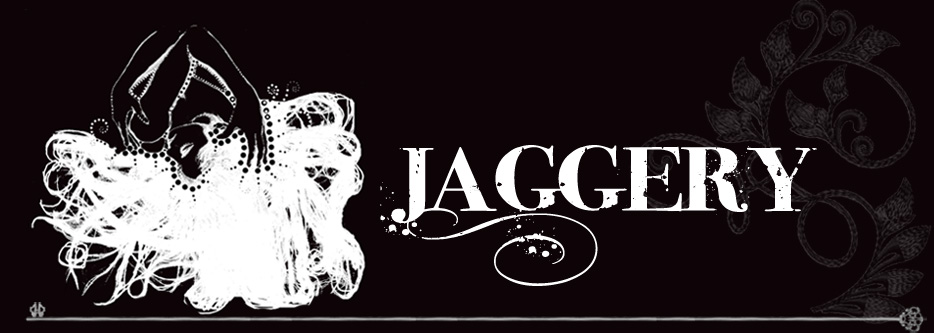Jaggery explores beauty, terror with ‘Crux’
I do not know what to say,” whispers vocalist Mali Sastri over a gorgeous roll of piano notes, at the very end of the Boston-based band Jaggery’s new album, “Crux.” And then, the piano cuts out suddenly, and she whispers, “I do not know what to be silent about.” It’s a sinister ending to an album that delves fearlessly into the abyss and is at turns bone-chilling and staggeringly beautiful.
Indeed, listening to “Crux” brings to mind a quote from author Donna Tartt, from her novel, “The Secret History,” “Beauty is terror. Whatever we call beautiful, we quiver before it.” As a songwriter, Sastri uses that polarity to great effect: The album’s first song, “War Cry,” begins with an unearthly banshee’s wail that’s both hypnotic and deeply unnerving. Near the song’s end, Rachel Jayson’s viola comes to the fore, and the sound is rich and beautiful, but while it is not as terrifying as the opening vocals, there’s still an edge to it, a distinct sense that this is the sort of beauty that can cut you.
In a very real way, “Crux” is an exploration of how beauty and terror are entwined, an exploration that allows the band to work within a great tonal range while still focusing the listener’s attention on individual instruments. The second song, “The Garden,” is more gentle and dissolute than “War Cry,” but when Dylan Jack’s percussion falls, it sounds like rain against a window. Likewise, Tony Leva’s bass at the beginning of “Walls Are Windows” is deep and jazzy, almost a bit of solid ground before the listener is immersed again in Sastri’s sinister vocals: “You better watch what you say,” she sings. “It’s all a part of the game that they play/they want you to think that you’re safe/but you can be sure that they’re the predator and we’re the prey./So pray.”
While most of the album’s dynamic tension resides in the vocals, there are a number of internal counterpoints in each song that add texture: “Icy,” for instance, capitalizes on the balance between Daniel Schubmehl’s percussion and Maeve Gilchrist’s harp. On “Venus in Transit,” the delicacy of Sastri’s piano plays against the fuzziness of Leva’s bass, and both cast a shadow over the pleading, plaintive qualities of the vocals. There’s a definite shift in this song, as an abiding sadness outweighs the darkness. It’s Jayson’s viola, here, that adds the sinister element: A creeping buzz of paranoia, an involuntary shudder.
Hitting the midway point with the album’s title song, the surprisingly gentle “Crux,” Sastri introduces an element of self-doubt: “Am I burnt out,” she sings, “am I unlit/am I just shifting with the light.” While the album is rife with introspection, most of its emotional content is communicated through the music. Here, the album’s persona seems smaller, vulnerable. The consequence of this is that the listener reciprocates that vulnerability. When “Raskolnikov” begins, with its jazzy intro and thick, Eastern European-inspired melody, the experience is not unlike being caught exposed in a storm. It’s bracing, and it changes tempo enough to catch the listener off guard. Everything here, from Petaluma Vale’s backing vocals to Mary Bilchner’s harp, keeps the listener off balance, spinning until they land in the gorgeous desolation of “Those Who.”
It’s in the next song, “This Way That Way,” that the album gets to the, pardon the pun, crux of the matter: “What is the nature of light and shadow,” sings Sastri, after a stunningly beautiful bit of harp playing from Vale (yes, there are three harpists on this album.) “Can one exist without the other/one casts a spell/one casts a pall.”
Here, all the dualities that have driven the album come to the fore, and both the persona and the listener feel themselves pulled by them, until the song’s sudden conclusion and the jazzy opening of the penultimate song, “Theory of Everything.”
“I can’t make sense of the chaos,” sings Sastri, and it’s almost ironic, because making sense of chaos is what this album does best. Her voice is a wail again here, but it’s more heart-wrenching here than terrifying. It’s the sound of lamentations against a night sky, and leaves the listener with a feeling of emptiness that informs the final song, “Nijinsky’s Diaries,” which uses text from “The Diary of Vaslav Nijinsky.” The song wobbles between intense whispers and mad ranting that dispels beauty from the darkness. “I will blow my brains out if God wants it,” she screams, and it’s almost impossible to not be horrified. Here, Sastri murders the romance of the darkness, and replaces it with a madness that soaks terror deep into the listener’s skin.
“I do not know what to be silent about,” she whispers, in the end, and afterward, there is nothing else.
full article link: http://www.telegram.com/article/20160512/ENTERTAINMENTLIFE/160519862

